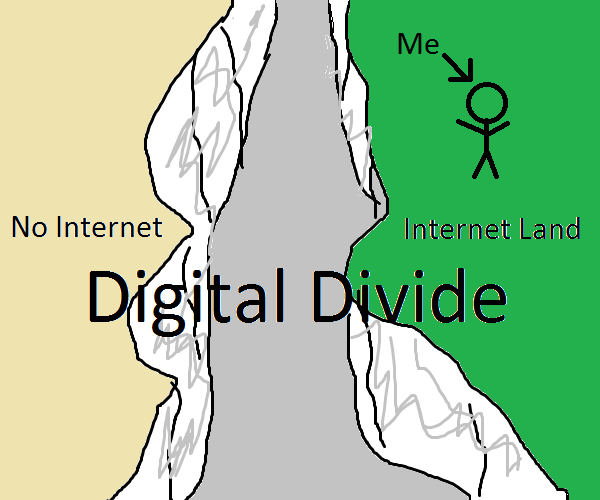415 - Homework 2
By Alistair Poole, 9/12/16
The Digital Divide
I have had the great privilege of having always been on the internet side of the Great Internet Divide. Being from smack in the middle of rich, upper-middle-class White Suburbia, I have had all the benefits of an internet soaked childhood.
People where I'm from enjoy it when they don't have the internet. It's called "disconnecting", and it's a matter of recreation rather than lifestyle.


To say that the internet has had an effect on my education would be an understatement. In sophomore year of highschool, I had a class in which accessing the internet for homework was required. Every day, instead of traditional homework assignments, we went home and watch a video lecture. If we didn't have internet, we were expected to go to the library or an coffeeshop. If that doesn't speak volumes about my school and internet, I don't know what would.
I have also been informed by a younger sibling that my old highschool now actually requires students bring their own devices.
The relevance
I can't say that I totally approve of the move a more and more digital world. I think that there's a lot of value in offline learning, but that doesn't change the fact that the world is becoming more and more digital. Which wouldn't be a problem if it was the entire world getting more and more digital, but it isn't
As always, the rich and the white are enjoying the best of things.

But... Is it not white people's fault this time?
Well... I'm going to remain skeptical, but according to Henry Louis Gates Jr. in an opinion piece in the NY Times, written 17 years ago, it's somewhat self-imposed. What I wonder is how that has changed in the last couple of decades. African-Americans are still far behind white people in terms of internet access, but is that still self-imposed, assuming that Mr. Gates was correct in the first place? Or is it simply a result of African-Americans being, on average, poorer, which has been proven as a strong indicator of internet access? I would be interested to know.
That is all from Alistair today.
peace
